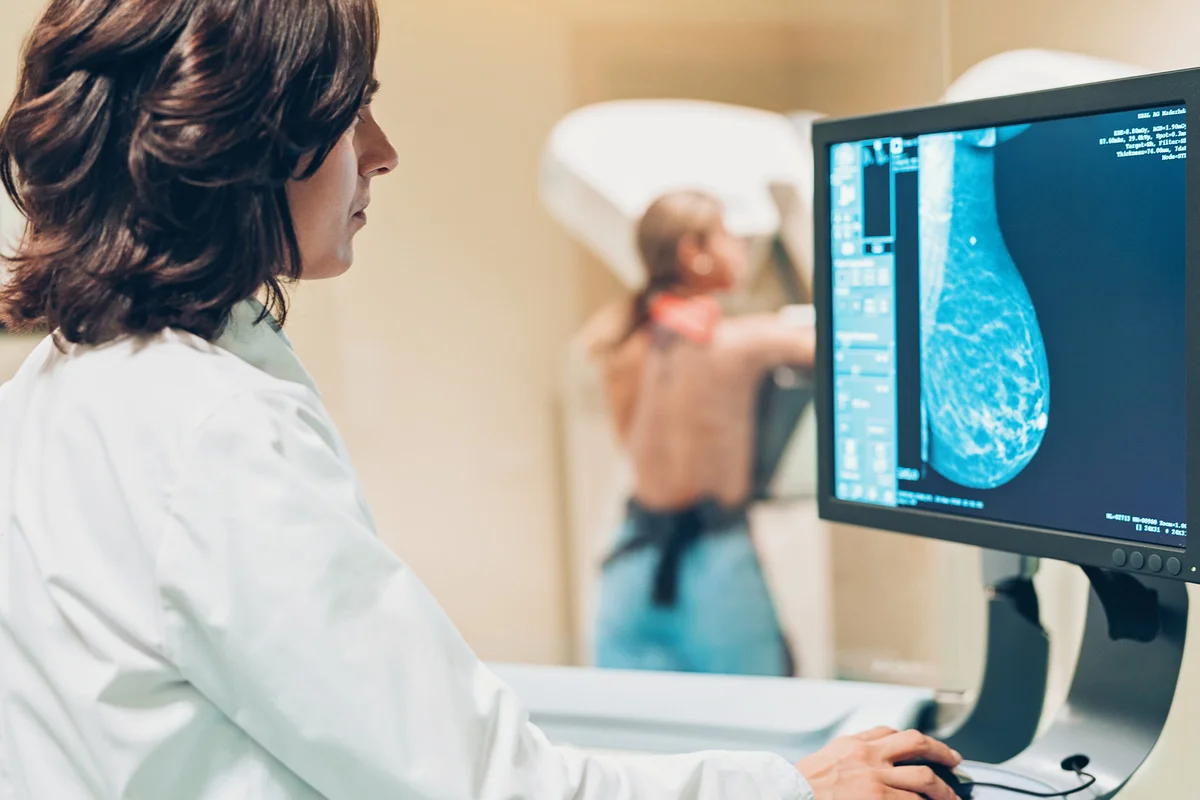An annual mammogram is an important tool for early detection of breast cancer. When you receive your mammogram results, you might also get a report informing you that you have dense breast tissue. It's important to pay attention to that status, as women with dense breast tissue are more likely to be diagnosed with breast cancer.
"Women with dense breasts do have an increased risk of breast cancer and the reasons are not clear," said Dr. William Cance, a surgical oncologist and chief medical and scientific officer for the American Cancer Society. "Separately, dense breasts make mammograms less sensitive for detecting cancers."
Women's breasts have three types of tissue — fibrous, glandular and fatty — and women with dense breasts have more fibrous tissues than fatty tissues. Breast density is not related to breast size or shape, nor is it indicative of any negative health condition; however, dense breast tissue is common. In fact, 40% to 50% percent of women ages 40-74 in the U.S. have dense breasts. Only about 10% of women have extremely dense breasts — meaning that nearly all of the breast tissue is dense.
Dense breast tissue is also more common in younger women — breast density can decrease as women age, but some women have the same breast composition their entire lives. Women with a lower body mass and women who take hormone therapy for menopause are also more likely to have dense breast tissue.
A personal story leads to advocacy
Joseph Cappello has spent close to two decades in advocacy work about the importance of knowing one's breast density status. His wife, Dr. Nancy Cappello, had been diligent about getting mammograms and had 11 years of supposedly normal mammograms before a doctor felt a lump in her breast during an annual exam in 2004.
That doctor sent her for another mammogram, which again detected nothing, and an ultrasound — which found a lesion that was later diagnosed as Stage 3C breast cancer that had metastasized to 13 lymph nodes. That was the first time Nancy, then 51, learned she had dense breast tissue and discovered how it had delayed detection and treatment of her cancer. Fatty tissue appears dark on a mammogram reading, while dense tissue does not.
"If a mammogram is given to a woman who has dense breast tissue, the mammogram will show that tissue as white," Joseph said. "The problem is that a tumor also shows up as white, and there's no contrast. If you don't realize you have dense breast tissue, you could be hiding a tumor and don't even know it."
Nancy asked her doctors why she wasn't told about her dense breast tissue status and learned it wasn't standard to do so. Outraged by her experience, she and her husband launched an organization, Are You Dense?, to educate women about dense breast tissue and the importance of understanding the relationship between dense breast tissue and cancer screenings. The organization also created an advocacy arm to pass legislation in each state to require professionals to inform women of their breast density status.
Before Nancy died in 2018, legislation had been passed in 36 states to require medical professionals to give women their breast density status. In early 2019, national legislation requiring women to be informed of their dense breast status was signed into law, meaning that all American women now have the legal right to be told of their breast tissue density.
"We've come a long way from 2004 when we thought we would just tell our family and friends about breast density, which nobody ever heard of," Joseph said. "And then we passed a law in [our home state of] Connecticut, and it just took off from there. I just hope we can keep doing justice to Nancy's work because she did so much for millions of women."
What to do if you have dense breasts
Being told of one's dense breast tissue status is just the first step. Women should then talk with their doctors about the potential need for further tests.
"There are additional screenings with MRI, ultrasound, 3D mammography (breast tomosynthesis) that are available and may help get better visualization of the breast tissue," Cance said. "However, their absolute value is not known yet and is being evaluated in ongoing trials."
Some of those screenings can expose women to low levels of radiation or detect areas of concern that aren't cancer, but could require even more testing or biopsies. Some can be expensive and not fully covered by insurance. That's why it's best to discuss the pros and cons of additional screening if you have dense breast tissue and decide whether to proceed based on your own health profile and family history. Women with dense breast tissue should still get regular mammograms.
For Joseph Cappello, who carries on the work of Are You Dense?, he's convinced that additional screening could have extended his wife's life. After surviving breast cancer, Nancy was diagnosed with bone marrow cancer in August 2018 and died three months later. Joseph said the blood cancer was caused by the extensive treatment she underwent in 2004 for her advanced-stage breast cancer.
"If Nancy had been given a simple ultrasound, if the doctor had said 'you have dense breast tissue, you need an ultrasound,' they would've caught this thing at stage 1 and maybe she could have had a lumpectomy or something like that instead of a mastectomy and heavy doses of chemotherapy and radiation," he said.
Resources
American Cancer Society
Breastcancer.org
Susan G. Komen
- Breast Density - HealthyWomen ›
- Olivia Munn’s Breast Cancer Diagnosis Is a Wake-Up Call for All Women - HealthyWomen ›
- El diagnóstico de cáncer de mama de Olivia Munn es una señal de alerta para todas las mujeres - HealthyWomen ›
- What You Should Know About Dense Breasts - HealthyWomen ›
- Lo que deberías saber sobre las mamas densas - HealthyWomen ›
- Don't Put Off Your Mammogram - HealthyWomen ›






